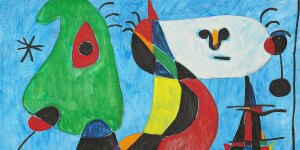Y oshitomo Nara’s iconic kowa kawaii (“scary cute”) wide-eyed little children, at times mutinous, melancholic, sweet and wicked – and sometimes even all at once – have developed a cult following across cultures and generations for their profound, intuitive expressions of human emotion. Nara’s little children began to appear in his work following his move to Germany, when language barriers plunged him back into a period of acute solitude not experienced since his childhood. Intensely lonely as if once again a young child with only his comics and family pets for company, Nara’s imagination found its outlet in his little contrarian protagonists.
50 Years New in Asia: Yoshitomo Nara's Message of Peace and Compassion
A shift of tone became apparent in Nara’s work in the aftermath of Japan’s Great Tōhoku Earthquake of 2011. After a period of reflection and engagement with local communities worst hit by the disaster, during which Nara found himself unable to sketch, paint or draw, he suddenly experienced a fresh surge of creative energy.
“It began with a small puddle in my heart.”

In the Milky Lake and Sprout in Hands articulate the artist’s shifting visual language. Gone are the depictions of children with their defiant, mischievous smiles and menacing stares. The knives, cigarettes, guns and guitars have been stripped away. Instead, Nara painted pensive and serene little beings, their forms closer to the proportions of real children, with their emotions channelled through their eyes and their hearts embodied in small but profound gestures. Recovery and rebirth are expressed through tiny budding plants and healing waters. Interviewed by the Wall Street Journal about the effects of the 2011 earthquake and tsunami on his work, Nara explained that his subsequent paintings offered a form of release, allowing him to “have a conversation with myself, and express my various feelings, like being mad or sad. Through painting, my soul gets transcended, then my negative feelings are gone.”

“The things I make are no longer self-portraits, but belong to the audience who finds themselves, their friends or children they know in my paintings.”
Nara artfully combines form and technique to proclaim his vision of the future. The little messenger of Sprout in Hands carries hope in his hands, a tiny seedling that will one day provide sustenance to generations of humans and animals. Although the sprout appears throughout Nara’s oeuvre, for example large-scale canvas works such as his famous The Little Ambassador (2000), and in smaller-scale works on paper and cardboard, its message takes on a new urgency after the devastating events of 2011. The large wood panel symbolises the possibility of reconstruction and transformation, its grain visible against the gentle blush of the child’s cheek. Although beset by tragedy and hardship, after the turmoil comes renewal and new life. Exhibited at Nara’s critically acclaimed exhibition A bit like you and me…, inspired by the Beatles song of the same name, at the Yokohama Museum of Art in 2012, Sprout in Hands travelled to Aomori Museum of Art before finishing at Kumamoto’s Contemporary Art Museum.

The larger-than-life protagonist of In the Milky Lake stands calmly in a gently rippling puddle. An enigmatic, dreamy gaze plays across her features, whilst her eyes are the beguiling soul of the painting. Meticulous layers of milky pigment bring a luminous opalescence, conjuring up the soothing waters of a sparkling lake that contrast with the dark and sombre tones of Nara’s earlier works. From ancient times, humans have revered the transformational power of water as the source of life on earth. Watery pools evoke a mysterious boundary between the inner and outer worlds, and the sense that Nara’s little children gaze back at the world from another realm beyond is a theme which appears in some of Nara’s earliest work – in the form of ripples in Fallen Angels (1986) and Pandora’s Box (1990), and submersion in 1995’s In the Deepest Puddle II. As well as honouring water as the source of life on earth, the motif of the lake speaks to Nara’s abiding love of music, and is partially inspired by John Hiatt’s album cover for Overcoats (1975), where the folk singer stands half-submerged in water in his overcoat. An emotional landscape that speaks of overcoming and transforming sadness, In the Milky Lake offers a universal and timeless message of peace and compassion, a balm upon the troubles of the world. This is the first time that In the Milky Lake has come to auction.
“I don't think too hard about it. This is just what comes out.”
Nara’s little protagonists speak across the generations. “He seems never to have met a culture or generation gap, a divide between art mediums or modes of consumption that he couldn't bridge or simply ignore,” commented the eminent The New York Times art critic Roberta Smith. Defying expectations and attempts to pin his work down as high, low, kitsch, East or West, mature or adolescent, Nara instead speaks a universal language of resounding hope in the future of our world.




